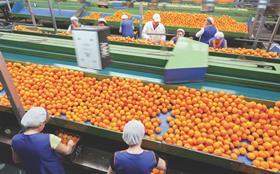
Spanish citrus producers say a decision by the European Union to reduce tariffs on South African citrus imports is compounding a “disastrous” campaign in which losses have already run into hundreds of millions of euros following last year’s flooding and earlier drought.
In June, the EU announced that it was extending the tariff-free period for South African imports by six weeks to the end of November, with tariffs being reduced gradually to zero over the next decade, a move denounced by Spanish producers who feared that the increased overlap with domestic production would hit their sales.
The Citrus Management Committee (CGC) said South African oranges were widely available in European supermarkets throughout December even though a drought in southern Africa had brought an earlier than expected end to the season.
“In many cases, the quality of these oranges has been very poor because they have already been in storage for weeks,” CGC spokesman Rafa Quillis told Fruitnet. “Moreover, they carry the risk of citrus black spot and other diseases that Brussels has been working so hard to mitigate through tighter controls and closer monitoring at ports of entry.”
The Unió de Llauradors cited the fact that South African Navels were still on sale at Día supermarkets in early January for €1.39 per kg was further evidence that the rule change was putting considerable pressure on prices.
According to Quillis, December’s heavy rains have brought the Spanish clementine season to an abrupt end and will bring forward harvesting of late season mandarins, Navels and Valencia oranges. Thousands of hectares remain waterlogged or flooded, causing widespread cases of pixat, cracked skin and even fruit rot.
“Having visited groves to assess the extent of the damage, companies are fine-tuning harvesting, packing and shipment schedules in order to avoid any loss of fruit quality,” he explained. “In spite of this, some consignments have already been rejected, forcing them to be even more vigilant.”
Forecasts at the outset of the season pointed to a total Spanish citrus crop of just over 7m tonnes, although an abundance of smaller sizes caused by the prolonged drought meant significantly less fruit would be available for export.
Quillis said the 2016/17 campaign had been effectively destroyed by the climate –beginning with the summer drought and ensuing small sizes, then the unseasonably mild autumn which discouraged demand and finally December’s heavy rains and floods.
“We have gone from expecting an abundant supply to facing the prospect of a shortage of late season mandarins,” he said. “However, hopefully the rainfall will go some way in mitigating the sizing issue during the latter stages of the season.”






No comments yet